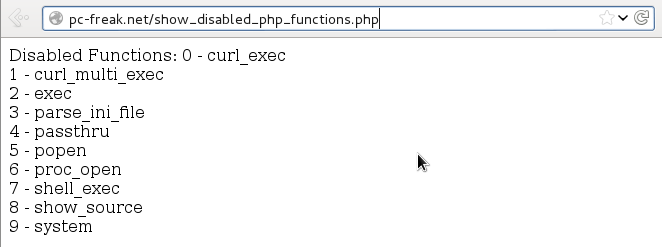
If you plan to build and distribute own RPMs securely, it is strongly recommended that all custom RPMs are signed using GNU Privacy Guard (GPG). Generating GPG keys and building GPG-signed packages matching it.
Hence, If you have to deal with some of the RPM based package management Linux distribution like CentOS / RHEL / Fedora etc. you will sooner or later end up in a situation where some of the archive signing keys for a package provided by some of the repositories is missing or it is not matching the keys provided for the RPM repo.
As a result you will be unable to install some package like lets say zabbix-sender or you won't be able to update a certain package to the latest available version, because the Archive Signing key is not found.
The usual naming for a RPM file with a GPG key in is YOUR-RPM-GPG-KEY.
A typical PGP Public key file content looks something like this:
—–BEGIN PGP PUBLIC KEY BLOCK—–
Version: GnuPG v1.0.0 (GNU/Linux)
Comment: For info see http://www.gnupg.org
mQGiBDfqVEqRBADBKr3Bl6PO8BQ0H8sJoD6p9U7Yyl7pjtZqioviPwXP+DCWd4u8
HQzcxAZ57m8ssA1LK1Fx93coJhDzM130+p5BG9mYSPShLabR3N1KXdXAYYcowTOM
GxdwYRGr1Spw8QydLhjVfU1VSl4xt6bupPbFJbyjkg5Z3P7BlUOUJmrx3wCgobNV
EDGaWYJcch5z5B1of/41G8kEAKii6q7Gu/vhXXnLS6m15oNnPVybyngiw/23dKjS
ti/PYrrL2J11P2ed0x7zm8v3gLrY0cue1iSba+8glY+p31ZPOr5ogaJw7ZARgoS8
BwjyRymXQp+8Dete0TELKOL2/itDOPGHW07SsVWOR6cmX4VlRRcWB5KejaNvdrE5
4XFtOd04NMgWI63uqZc4zkRa+kwEZtmbz3tHSdWCCE+Y7YVP6IUf/w6YPQFQriWY
FiA6fD10eB+BlIUqIw80EqjsBKmCwvKkn4jg8kibUgj4/TzQSx77uYokw1EqQ2wk
OZoaEtcubsNMquuLCMWijYhGBBgRAgAGBQI36lRyAAoJECGRgM3bQqYOhyYAnj7h
VDY/FJAGqmtZpwVp9IlitW5tAJ4xQApr/jNFZCTksnI+4O1765F7tA==
=3AHZ
—–END PGP PUBLIC KEY BLOCK—–
The usual naming for a RPM file with a GPG key in is YOUR-RPM-GPG-KEY
1. List RPM gpg keys installed on system
To list all the installed RPM gpg keys on the system do:
rpm -q gpg-pubkey
To get a list of the number of installed keys with verbose info with key description::
rpm -qa gpg-pubkey –qf "%{version}-%{release} %{summary}\n"|wc -l
rpm -qa gpg-pubkey –qf "%{version}-%{release} %{summary}\n"
fdb19c98-56fd6333 gpg(Fedora 25 Primary (25) <fedora-25-primary@fedoraproject.org>)
7fac5991-4615767f gpg(Google, Inc. Linux Package Signing Key <linux-packages-keymaster@google.com>)
64dab85d-57d33e22 gpg(Fedora 26 Primary (26) <fedora-26-primary@fedoraproject.org>)
fa7a179a-562bcd6e gpg(RPM Fusion nonfree repository for Fedora (25) <rpmfusion-buildsys@lists.rpmfusion.org>)
6806a9cb-562bce39 gpg(RPM Fusion free repository for Fedora (25) <rpmfusion-buildsys@lists.rpmfusion.org>)
d38b4796-570c8cd3 gpg(Google Inc. (Linux Packages Signing Authority) <linux-packages-keymaster@google.com>)
[root@host ~:]# rpm -q gpg-pubkey –qf '%{NAME}-%{VERSION}-%{RELEASE}\t%{SUMMARY}\n'
gpg-pubkey-f4a80eb5-53a7ff4b gpg(CentOS-7 Key (CentOS 7 Official Signing Key) )
gpg-pubkey-b6792c39-53c4fbdd gpg(CentOS-7 Debug (CentOS-7 Debuginfo RPMS) )
gpg-pubkey-8fae34bd-538f1e51 gpg(CentOS-7 Testing (CentOS 7 Testing content) )
To list all OS installed gpg keys do:
[user@host ~:]$ $ rpm -qa | grep -i gpg
gpg-pubkey-db42a60e-37ea5438
2. Import RPM-GPG-KEY
A new key be it official archive keys issued from Fedora or a custom own build RPM package can be imported Redhat Package Manager like so:
[root@host ~:]# rpm –import RPM-GPG-KEY
It is possible to also import multiple GPG signature keys, for example on CentOS the usual path containg keys is /etc/pki/rpm-gpg/ to import all of the contained files there:
[root@host ~:]# rpm –import /etc/pki/rpm-gpg/*
3. Check package with imported gpg arch key
Once the RPM-GPG-KEY is imported you can compare whether a RPM package matches with the key signature.
[root@host ~:]# rpm –checksig package-1.3-3.src.rpm
[root@host ~:]# rpm –checksig xtoolwait-1.3-3.src.rpm
package-1.3-3.src.rpm: (sha1) dsa sha1 md5 gpg OK
4. Remove RPM installed arch key
If you have installed some gpg arch. key by mistake and you need to remove it:
[root@host ~:]#rpm -e gpg-pubkey-b6792c39-53c4fbdd
To make sure it is remove do a Listing once again signing archive keys, it should not show anymore:
[root@host ~:]# rpm -q gpg-pubkey –qf '%{NAME}-%{VERSION}-%{RELEASE}\t%{SUMMARY}\n'
gpg-pubkey-f4a80eb5-53a7ff4b gpg(CentOS-7 Key (CentOS 7 Official Signing Key) )
gpg-pubkey-8fae34bd-538f1e51 gpg(CentOS-7 Testing (CentOS 7 Testing content) )







